Places where I have been in Massachusetts:
Boston
The Commonwealth of Massachusetts is a state in the New England region of the northeastern United States. It is bordered by Rhode Island and Connecticut to the south, New York to the west, and Vermont and New Hampshire to the north; at its east lies the Atlantic Ocean. Most of its population of 6.4 million lives in the Boston metropolitan area. The eastern half of the state is made up of urban, suburban, and rural areas, while Western Massachusetts is mostly rural. Massachusetts is the most populous of the six New England states. It ranks third among U.S. states in GDP per
of the northeastern United States. It is bordered by Rhode Island and Connecticut to the south, New York to the west, and Vermont and New Hampshire to the north; at its east lies the Atlantic Ocean. Most of its population of 6.4 million lives in the Boston metropolitan area. The eastern half of the state is made up of urban, suburban, and rural areas, while Western Massachusetts is mostly rural. Massachusetts is the most populous of the six New England states. It ranks third among U.S. states in GDP per  capita.
capita.
Massachusetts has been significant throughout American history. Plymouth was the second permanent English settlement in North America. Many of Massachusetts's towns were founded by colonists from England in the 1620s and 1630s. During the eighteenth century, Boston became known as the "Cradle of Liberty" for the agitation there – Ralph Waldo Emerson later called it the Shot heard round the world—which led to the American Revolution and the independence of the United States from Great Britain. In the late eighteenth century, Massachusetts was the first U.S. state to abolish slavery. Also, it was a center of the temperance movement and abolitionist activity before the American Civil War. In 2004, Massachusetts became the first U.S. state to legally recognize same-sex marriage. The state has contributed many prominent politicians to national service, including the Adams family and, more recently, the Kennedy family.
Originally dependent on agriculture and trade with Europe, Massachusetts was transformed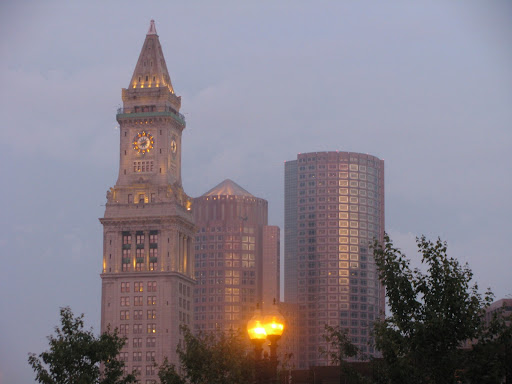 into a manufacturing center during the Industrial Revolution. During the twentieth century, the state's economy shifted from manufacturing to services. Today, the state is a leader in higher education, health care, high technology, and financial services.
into a manufacturing center during the Industrial Revolution. During the twentieth century, the state's economy shifted from manufacturing to services. Today, the state is a leader in higher education, health care, high technology, and financial services.
Massachusetts was originally inhabited by several Algonquian tribes: the Wampanoag, Nauset, Nipmuc, Pocomtuc, Pennacook, Mahican, Massachuset, and some Narragansett and Pequot. A vast number of the indigenous people were killed by waves of smallpox inadvertently brought to the New World by Sir Herbert Popham and his ship to the Saco, Maine area in 1622.
The first European settlers in Massachusetts, the Pilgrims, established their settlement at Plymouth in 1620, and developed friendly relations with the native Wampanoag. This was the second successful permanent English colony in North America, after the Jamestown Colony; both were preceded by temporary camps, the unsuccessful Popham Colony, and Spanish settlements in Florida in the 1500s. Most early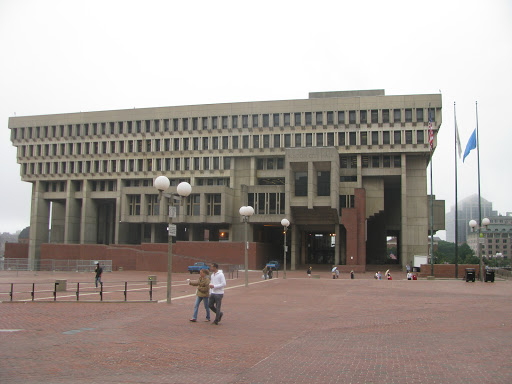 settlers came from within 60 miles (100 km) of Haverhill, England. The Pilgrims were soon followed by more Puritans who established the Massachusetts Bay Colony at present-day Boston in 1630. The Puritans, whose beliefs included exclusive understanding of the literal truth of the Bible, came to Massachusetts for religious freedom. Dissenters such as Anne Hutchinson, Roger Williams, and Thomas Hooker left Massachusetts because of the Puritan society's lack of religious tolerance. In 1636, Williams founded the colony of Rhode Island, and Hooker founded Connecticut.
settlers came from within 60 miles (100 km) of Haverhill, England. The Pilgrims were soon followed by more Puritans who established the Massachusetts Bay Colony at present-day Boston in 1630. The Puritans, whose beliefs included exclusive understanding of the literal truth of the Bible, came to Massachusetts for religious freedom. Dissenters such as Anne Hutchinson, Roger Williams, and Thomas Hooker left Massachusetts because of the Puritan society's lack of religious tolerance. In 1636, Williams founded the colony of Rhode Island, and Hooker founded Connecticut.
By 1636, the colonists had also begun to settle the inland Pioneer Valley along the Connecticut River, where the state's best agricultural land is concentrated.
Native American-European racial tensions led to King Philip's War of the years 1675–76. Mendon was involved in an early battle in July 1675 and settlers were killed in the Blackstone Valley. There were major campaigns in this war in the Pioneer Valley and Plymouth Colony. In 1690 there was an unsuccessful expedition against French Quebec under William Phips. Massachusetts became a single colony in 1692, the largest in New England, and one where many American institutions and traditions were formed. The colony fought alongside British regulars in a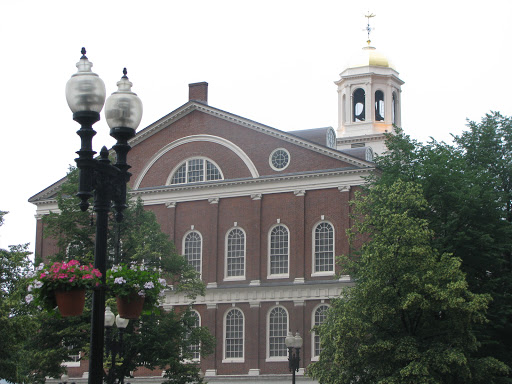 series of French and Indian Wars that were characterized by brutal border raids and successful attacks on British forces in New France.
series of French and Indian Wars that were characterized by brutal border raids and successful attacks on British forces in New France.
Massachusetts was a center of the movement for independence from Great Britain, earning it the nickname, the "Cradle of Liberty". Colonists here had long had uneasy relations with the British monarchy, including open rebellion under the Dominion of New England in the 1680s.
The Boston Tea Party is an example of the protest spirit of the later pre-revolutionary period in the 1770s, and the Boston Massacre is a famous incident which escalated the conflict. Actions by patriots such as Sam Adams and John Hancock followed by counter-actions by the Crown were a main reason for the unity of the Thirteen Colonies and the outbreak of the American Revolution. The Battles of Lexington and Concord initiated the American Revolutionary War and were fought in the Massachusetts towns of Concord and Lexington.
Future President George Washington took over what would become the Continental Army after the battle. His first victory was the 11 month Siege of Boston in early 1776, where his successful fortification of Dorchester Heights forced the British to withdraw from Boston on March 17. This day is celebrated in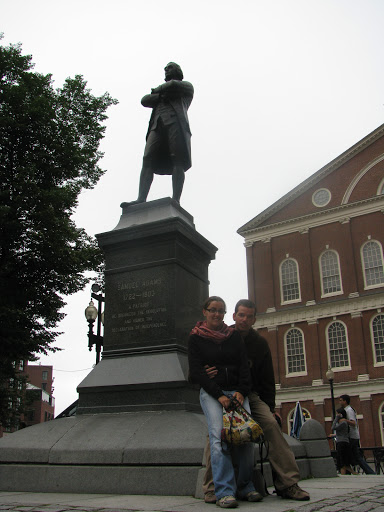 Massachusetts as Evacuation Day.
Massachusetts as Evacuation Day.
The Massachusetts Constitution was ratified in 1780.
After independence and during the formative years of independent American government, Shays' Rebellion was an armed uprising in the western half of the state from 1786 to 1787. The rebels were mostly small farmers angered by crushing war debt and taxes.
On March 15, 1820, Maine separated from Massachusetts, of which it had been first a contiguous and then a non-contiguous part, and entered the Union as the 23rd state as a result of the ratification of the Missouri Compromise.
During the 19th century, Massachusetts and the New England region became a national and world leader in the Industrial Revolution, with the development of machine tools and textiles. The economy transformed from primarily agricultural to industrial, initially making use of its many rivers, and later the steam engine to power factories for textiles, shoes, furniture, and machinery that drew labor from Yankees on subsistence farms at first, and later drew upon immigrant labor from Canada and Europe.
Horace Mann made the state system of schools the national model. Henry David Thoreau and Ralph Waldo Emerson made major contributions to American thought. Members of the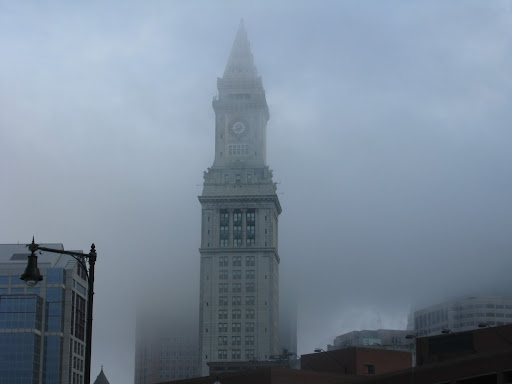 Transcendentalism movement, they emphasized the importance of the natural world to humanity.
Transcendentalism movement, they emphasized the importance of the natural world to humanity.
In the years leading up to the Civil War, Massachusetts was a center of social progressivism, the temperance movement, and abolitionist activity within the United States. Antagonism to these views resulted in anti-abolitionist riots in Massachusetts between 1835 and 1837. The works of abolitionists contributed to subsequent actions of the state during the Civil War. Massachusetts was the first U.S. state to abolish slavery, in a 1783 judicial interpretation of its 1780 constitution, and was the first state to recruit, train, and arm a Black regiment with White officers, the 54th Massachusetts Volunteer Infantry. The Robert Gould Shaw Memorial in Boston Common contains a relief depicting the 54th regiment.
Massachusetts would establish itself as a leader in education and innovation during this time. Alexander Graham Bell invented his telephone in Boston in 1876.
The industrial economy began a decline in the early twentieth century with the exodus of many manufacturing companies. By the 1920s competition from the South, followed by the Great Depression, led to the collapse of Massachusetts' two main industries, textiles and shoes, although a few companies would survive into the 1950s. In the years following World War II, Massachusetts was transformed from a factory system to a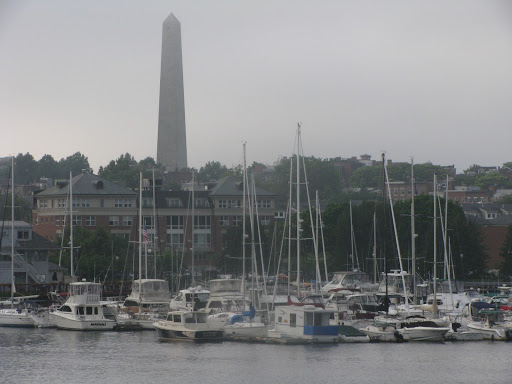 largely service and high-tech based economy. Some manufacturing does exist in the State today, generally in specialized markets.
largely service and high-tech based economy. Some manufacturing does exist in the State today, generally in specialized markets.
Government contracts, private investment, and research facilities led to a new and improved industrial climate, with reduced unemployment and increased per capita income. Suburbanization flourished, and by the 1970s, the Route 128 corridor was dotted with high-technology companies who recruited graduates of the area's many elite institutions of higher education.
The Kennedy family was prominent in Massachusetts politics in the 20th century, especially with President John F. Kennedy in the 1960s. The famous Kennedy Compound is located at Hyannisport on Cape Cod.
In recent years tourism has played an ever-important role in the state's economy, with Boston and Cape Cod being the leading destinations. Other popular tourist destinations include Salem, Plymouth and the Berkshires.
In 1987, the state received federal funding for the Central Artery/Tunnel Project. Known as the "the Big Dig," it was at the time the biggest federal highway project ever approved. Often controversial, with its estimated $14.6 billion price tag, and claims of mismanagement, the Big Dig has changed the face of Downtown Boston, connecting areas that were once divided by elevated highway, and improving traffic conditions.
In 2004, Massachusetts became the first state in the country to legalize same-sex marriage, and the sixth jurisdiction in the world to do so.
On November 4, 2008, citizens of the state voted to decriminalize the possession of marijuana. Effective January 2, 2009, a person, 18 years of age or older, caught with an ounce or less of marijuana may be charged with a $100 fine as well as face confiscation of any marijuana on their person. The violation will only be considered a civil violation. Also on that ballot, the citizens voted to ban greyhound racing in the state.


June 2009
Boston
The Commonwealth of Massachusetts is a state in the New England region
 of the northeastern United States. It is bordered by Rhode Island and Connecticut to the south, New York to the west, and Vermont and New Hampshire to the north; at its east lies the Atlantic Ocean. Most of its population of 6.4 million lives in the Boston metropolitan area. The eastern half of the state is made up of urban, suburban, and rural areas, while Western Massachusetts is mostly rural. Massachusetts is the most populous of the six New England states. It ranks third among U.S. states in GDP per
of the northeastern United States. It is bordered by Rhode Island and Connecticut to the south, New York to the west, and Vermont and New Hampshire to the north; at its east lies the Atlantic Ocean. Most of its population of 6.4 million lives in the Boston metropolitan area. The eastern half of the state is made up of urban, suburban, and rural areas, while Western Massachusetts is mostly rural. Massachusetts is the most populous of the six New England states. It ranks third among U.S. states in GDP per  capita.
capita.Massachusetts has been significant throughout American history. Plymouth was the second permanent English settlement in North America. Many of Massachusetts's towns were founded by colonists from England in the 1620s and 1630s. During the eighteenth century, Boston became known as the "Cradle of Liberty" for the agitation there – Ralph Waldo Emerson later called it the Shot heard round the world—which led to the American Revolution and the independence of the United States from Great Britain. In the late eighteenth century, Massachusetts was the first U.S. state to abolish slavery. Also, it was a center of the temperance movement and abolitionist activity before the American Civil War. In 2004, Massachusetts became the first U.S. state to legally recognize same-sex marriage. The state has contributed many prominent politicians to national service, including the Adams family and, more recently, the Kennedy family.
Originally dependent on agriculture and trade with Europe, Massachusetts was transformed
Massachusetts was originally inhabited by several Algonquian tribes: the Wampanoag, Nauset, Nipmuc, Pocomtuc, Pennacook, Mahican, Massachuset, and some Narragansett and Pequot. A vast number of the indigenous people were killed by waves of smallpox inadvertently brought to the New World by Sir Herbert Popham and his ship to the Saco, Maine area in 1622.
The first European settlers in Massachusetts, the Pilgrims, established their settlement at Plymouth in 1620, and developed friendly relations with the native Wampanoag. This was the second successful permanent English colony in North America, after the Jamestown Colony; both were preceded by temporary camps, the unsuccessful Popham Colony, and Spanish settlements in Florida in the 1500s. Most early
By 1636, the colonists had also begun to settle the inland Pioneer Valley along the Connecticut River, where the state's best agricultural land is concentrated.
Native American-European racial tensions led to King Philip's War of the years 1675–76. Mendon was involved in an early battle in July 1675 and settlers were killed in the Blackstone Valley. There were major campaigns in this war in the Pioneer Valley and Plymouth Colony. In 1690 there was an unsuccessful expedition against French Quebec under William Phips. Massachusetts became a single colony in 1692, the largest in New England, and one where many American institutions and traditions were formed. The colony fought alongside British regulars in a
Massachusetts was a center of the movement for independence from Great Britain, earning it the nickname, the "Cradle of Liberty". Colonists here had long had uneasy relations with the British monarchy, including open rebellion under the Dominion of New England in the 1680s.
The Boston Tea Party is an example of the protest spirit of the later pre-revolutionary period in the 1770s, and the Boston Massacre is a famous incident which escalated the conflict. Actions by patriots such as Sam Adams and John Hancock followed by counter-actions by the Crown were a main reason for the unity of the Thirteen Colonies and the outbreak of the American Revolution. The Battles of Lexington and Concord initiated the American Revolutionary War and were fought in the Massachusetts towns of Concord and Lexington.
Future President George Washington took over what would become the Continental Army after the battle. His first victory was the 11 month Siege of Boston in early 1776, where his successful fortification of Dorchester Heights forced the British to withdraw from Boston on March 17. This day is celebrated in
The Massachusetts Constitution was ratified in 1780.
After independence and during the formative years of independent American government, Shays' Rebellion was an armed uprising in the western half of the state from 1786 to 1787. The rebels were mostly small farmers angered by crushing war debt and taxes.
On March 15, 1820, Maine separated from Massachusetts, of which it had been first a contiguous and then a non-contiguous part, and entered the Union as the 23rd state as a result of the ratification of the Missouri Compromise.
During the 19th century, Massachusetts and the New England region became a national and world leader in the Industrial Revolution, with the development of machine tools and textiles. The economy transformed from primarily agricultural to industrial, initially making use of its many rivers, and later the steam engine to power factories for textiles, shoes, furniture, and machinery that drew labor from Yankees on subsistence farms at first, and later drew upon immigrant labor from Canada and Europe.
Horace Mann made the state system of schools the national model. Henry David Thoreau and Ralph Waldo Emerson made major contributions to American thought. Members of the
In the years leading up to the Civil War, Massachusetts was a center of social progressivism, the temperance movement, and abolitionist activity within the United States. Antagonism to these views resulted in anti-abolitionist riots in Massachusetts between 1835 and 1837. The works of abolitionists contributed to subsequent actions of the state during the Civil War. Massachusetts was the first U.S. state to abolish slavery, in a 1783 judicial interpretation of its 1780 constitution, and was the first state to recruit, train, and arm a Black regiment with White officers, the 54th Massachusetts Volunteer Infantry. The Robert Gould Shaw Memorial in Boston Common contains a relief depicting the 54th regiment.
Massachusetts would establish itself as a leader in education and innovation during this time. Alexander Graham Bell invented his telephone in Boston in 1876.
The industrial economy began a decline in the early twentieth century with the exodus of many manufacturing companies. By the 1920s competition from the South, followed by the Great Depression, led to the collapse of Massachusetts' two main industries, textiles and shoes, although a few companies would survive into the 1950s. In the years following World War II, Massachusetts was transformed from a factory system to a
Government contracts, private investment, and research facilities led to a new and improved industrial climate, with reduced unemployment and increased per capita income. Suburbanization flourished, and by the 1970s, the Route 128 corridor was dotted with high-technology companies who recruited graduates of the area's many elite institutions of higher education.
The Kennedy family was prominent in Massachusetts politics in the 20th century, especially with President John F. Kennedy in the 1960s. The famous Kennedy Compound is located at Hyannisport on Cape Cod.
In recent years tourism has played an ever-important role in the state's economy, with Boston and Cape Cod being the leading destinations. Other popular tourist destinations include Salem, Plymouth and the Berkshires.
In 1987, the state received federal funding for the Central Artery/Tunnel Project. Known as the "the Big Dig," it was at the time the biggest federal highway project ever approved. Often controversial, with its estimated $14.6 billion price tag, and claims of mismanagement, the Big Dig has changed the face of Downtown Boston, connecting areas that were once divided by elevated highway, and improving traffic conditions.
In 2004, Massachusetts became the first state in the country to legalize same-sex marriage, and the sixth jurisdiction in the world to do so.
On November 4, 2008, citizens of the state voted to decriminalize the possession of marijuana. Effective January 2, 2009, a person, 18 years of age or older, caught with an ounce or less of marijuana may be charged with a $100 fine as well as face confiscation of any marijuana on their person. The violation will only be considered a civil violation. Also on that ballot, the citizens voted to ban greyhound racing in the state.


June 2009
You have read this article with the title MASSACHUSETTS, UNITED STATES. You can bookmark this page URL http://oinsweden.blogspot.com/2009/07/massachusetts-united-states.html. Thanks!
Write by:
AN - Tuesday, July 21, 2009








.jpg)

Comments "MASSACHUSETTS, UNITED STATES"
Post a Comment